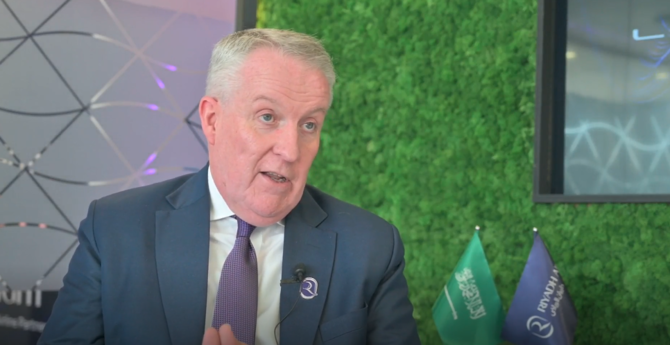DUBAI: Saudi Arabia’s new airline, Riyadh Air, is aiming to reintroduce some “romance” into traveling, according to its chief operating officer.
In an interview with Arab News at Dubai Airshow 2023, Peter Bellew talked up the digital-first focus of the carrier, which will see passengers’ faces serving as their boarding passes.
His comments came after the company revealed the second livery for its wide-body aircraft through virtual reality, allowing visitors to experience the airline through their phones.
Saudi Crown Prince Mohammed bin Salman announced the creation of the new national airline in March, with Riyadh Air set to make its first flight in 2025.
The COO declined to say if there are confirmed destinations for the airline but said the company is set to have links with over 100 airports from Riyadh by 2030.
Reflecting on the focus on creating an unrivaled customer experience, Bellew said that in the early days of aircraft-powered tourism, the trip to the airport was seen as part of the positive experience of traveling.
“Maybe travel has lost that a little bit,” he said, adding: “What we’re trying to do is put that back into travel so that people will actually look forward to traveling, coming to the airport, visiting our lounges, being on board our aircraft no matter what class of travel they go in, (and) that we try and put a little bit of the romance back into travel so people will actually be actively looking forward to traveling with Riyadh Air as part of their overall holiday and their journey rather than maybe traveling on an aircraft as a chore.”
The airline’s goal to deliver a ticketless experience is a key part of this, and Bellew said: “Once passengers register their details with the airline, their biometrics will be recognized and will ensure a smooth traveling experience with no need to have physical tickets or boarding passes, your face will be your ticket.”
The new livery features an iridescent white aircraft, which differs from the indigo exterior announced at the Paris Air Show in June.
The color purple is representative of the Saudi lavender flower which represents the regal experience of the airline, said Bellew.
Riyadh Air’s latest livery continues the indigo theme inspired by canopies of traditional Bedouin tents and curves of Arabic calligraphy.
Bellew said the decision to reveal the livery via VR was in touch with the company’s goal to become a fully digital native airline.
“Everything we are doing throughout the airline is digital in nature. The obvious thing to do instead of spending money on painting an aircraft is to do the reveal digitally, which I don’t think is common and has the potential to go viral,” he said, adding: “The reaction has been great, and it’s proved to be a unique idea.”
Bellew said Saudi Arabia is the perfect country to launch a project as big as this as the Kingdom is “so digitally enabled.”
He added: “We plan to leave no stone unturned to treat people really as if they were guests in our own house and the way we travel,” he said.
With Saudi Vision 2030 in mind, Bellew said Riyadh Air is in line with the sustainability goals of the Kingdom.
“We are brand new; we’re getting brand new aircraft, so they will be highly fuel efficient. But also the way we run the airline, the way the software that we run, the way we plan our flights, everything like that, I think we will learn a lot that would benefit the rest of the airline industry,” he said.
“We’ve ordered 72 Boeing 787 aircraft. We expect the fleet will go up to about 170 aircraft by 2030, and we will be really focusing on linking Riyadh with direct flights to all the major capitals in the world that are within range of Riyadh,” he said.
Bellew was clear that he not only sees the airline benefiting from being a Saudi company but also that the Kingdom will profit from the company, particularly through establishing aviation training infrastructure.
“If I can help grow the world’s best education for Saudi Arabia and give them an opportunity, I would be very happy. If I could travel in 15 years and meet young Saudi people running other airlines from what they’ve learned in the Kingdom, from what we’ve established, for me, I’d be very proud of that,” he added.
Dubai Airshow 2023 is taking place from Nov. 13 - 17 at Al Maktoum International Airport and features 1,400 exhibitors from 48 countries, with over 180 advanced commercial, private and military aircraft on display.
Other Saudi companies at the airshow include Saudia Airlines and Saudi Aerospace Co.





















